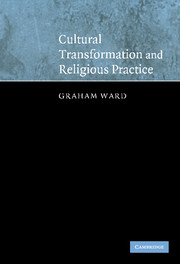Book contents
2 - The governing question II: how do cultures change?
Published online by Cambridge University Press: 15 December 2009
Summary
Having demonstrated in the last section how profoundly embedded theological discourse is in its cultural context, in this second section I wish to examine what the processes are by which cultures and, thereby, the public perception of reality change. If, with Marx and against him, the Christian vision is not simply to interpret the world but to work for its transformation, then how are the major knowledges of any particular time and place produced and what causes them to change? Why is it, for example, that the belief in angels was widely held in Mediaeval Christendom, widely rejected in Enlightenment's modernity, and currently regaining ground in what, as shorthand, we might term postmodernity? Another question lurks behind my initial one: how does the theological project (Christian, in this instance) become a transformative public practice with respect to the cultures that contextualise it? In Cities of God, I drew upon the critical reflections of anthropologists like Clifford Geertz, Sherry Ortner, James W. Fernandez, Victor Turner and Homi Bhabha in order to develop a theological approach to reading the signs of the times. But here what I wish to provide is not tools for the description of a culture or the recognition of an important cultural axis. Rather, I wish to examine the relationship between the critical interpretation, production and the transformation of cultures. To some extent, such an examination would be just another way of looking at the operations and productions in which Barth's work was and still is situated.
- Type
- Chapter
- Information
- Cultural Transformation and Religious Practice , pp. 61 - 116Publisher: Cambridge University PressPrint publication year: 2004



